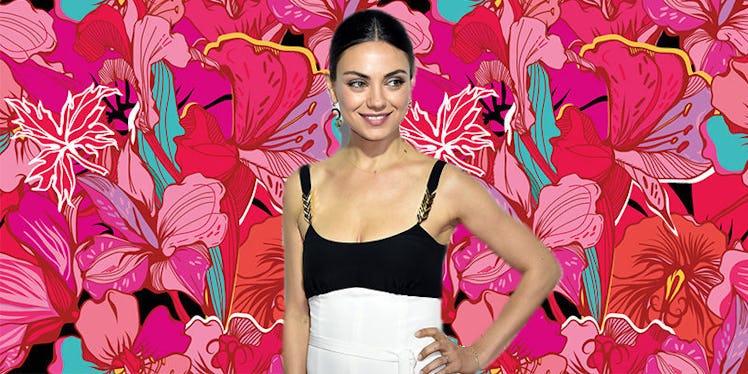
Why Mila Kunis's Latest Magazine Cover Is About So Much More Than Makeup
Going without makeup changes a woman's face, softening the lines so dramatically created by contour and highlights. Take away her mascara and the average adult woman looks 10 years younger. There's just something so innocent about a naked face, freshly washed for the day.
And 2016 has seen a spate of bare-faced trends: no-makeup makeup (just a BB cream and a prayer), dewy skin (highlighted cheekbones, lightly curled lashes) and now, finally, no cosmetics at all.
On the cover of Glamour's August issue, expectant mom and actress Mila Kunis, 32, poses totally barefaced. According to Ying Chu, Glamour's beauty director, she's only wearing skin serum and lip balm.
The move isn't new, of course. Celebrities have been pulling the “here's my real face” card for years. But it does seem as if we're ushering in a new wave of self-representation in the selfie era.
Natural is in, whether that's in the bras we're buying or hairstyles that seem like glorified bedhead. Years of sun have damaged your delicate facial skin? Buy a few LED light treatments and get over it. Skin is in, particularly the unedited kind.
I've been reflecting on what it means to be a player in the game of female culture recently, seeing as I've picked up Emma Cline's beach-read novel “The Girls.” For hundreds of pages, the 14-year-old narrator wonders how to get attention from the men around her and, more importantly, how to keep it. Then she considers why it is all the women in her life hover silently until they can get a man's attention.
The novel has me thinking: If women are taught from the earliest of ages how to cover our faces, make ourselves beautiful and play that character, maybe the most empowering thing to do is not. To drop the fancy brushes and contour powder, putting our asymmetrical faces on display.
A Saturday morning might be one thing, but eschewing the bronzer on a Monday is undoubtedly more weighty. A highly popularized study that dropped earlier this year revealed beautiful (and artificially beautiful) women earn 20 percent more money than their foundation-less counterparts.
It makes sense, when you start considering the psychological implications of makeup. From an evolutionary standpoint, humans respond to proportionally large eyes. Lids rimmed with mascara and shadow create an optical illusion, eliciting the kind of compassion people usually save for kittens and babies. By putting down your XXL Volume mascara brush, you're willfully stepping away from the world of drawn-on illusions.
Now, that's not to say I have some deep-seated hatred toward makeup. I'm a beauty editor who owns no less than four mascara tubes at any given time. Discussing the texture of face masks is the kind of thing that keeps me up late at night. But there's a time and a place for cosmetics. Use them because you enjoy them, not because they're a crutch that keeps you looking presentable.
After all, who decides what “presentable” really is? Is it a magazine's beauty director, in charge of making sure the issue sells, or is it the star? Kunis, who often tells press about a past steeped in childhood bullying over her looks, reveals her vulnerable side by going bare. If she can do it, why can't we all?